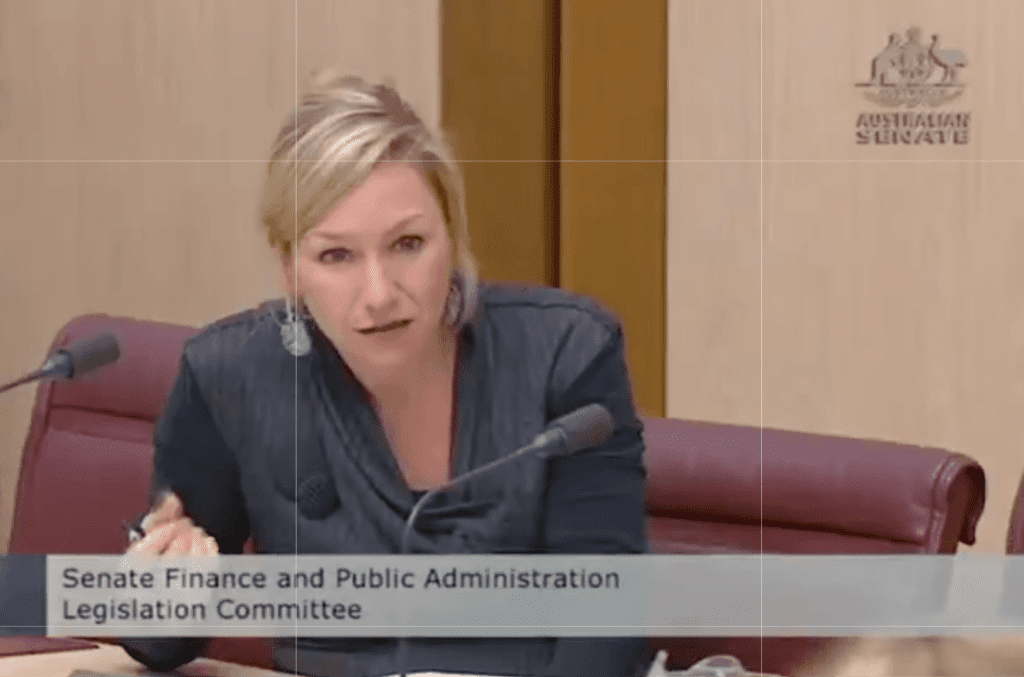“It’s called Parliament,” Waters immediately responded to the question.
But Leyonhjelm persisted, asking Trish Bergin, the First Assistant Secretary of the Office for Women, if an ‘Office for Men’ would be complementary or competitive to the Office for Women
Here’s part of the transcript:
Senator LEYONHJELM: The Office of women was established to advance gender equality and improve the lives of Australian women. Would you consider your work to be undermined if there was also an office for men?
Senator WATERS: It is called parliament, Senator Leyonhjelm.
Ms Bergin: We work towards gender equality and certainly there are times when policy response would necessarily involve addressing the needs of men in that.
Senator LEYONHJELM: Would your work be assisted if there were an office for men?
CHAIR: Senator Leyonhjelm, you probably shouldn’t be asking officials for an expression on a matter of policy.
Senator LEYONHJELM: That is not a policy; that’s an operational question.
CHAIR: Whether there should be another department sounds, to me, like a question of policy
Senator LEYONHJELM: No, it’s not. It’s a question of operational effectiveness.
Bergin: Could you repeat the question, please?
Senator LEYONHJELM: Would your work be assisted if there were an office for men?
Ms Bergin: We would work across government, so, yes, of course we would work with them.
Senator LEYONHJELM: One of your objectives is ensuring that women and their children are safe from violence. Would an office for men that ensured that men and their children were safe from violence be complementary or competitive to your office?
Ms Bergin: It would be complementary.
Senator WATERS: You realise most perpetrators are men? That’s kind of the point.
CHAIR: Senator Leyonhjelm didn’t interject during your questions. I will ask you to do the same, please.
Senator WATERS: That’s because they weren’t inflammatory; they were substantive. Anyway, I’ll be quiet.
Senator LEYONHJELM: Is there any discomfort or concern within your office about the absence of any focus on men at all?
Ms Bergin: There is a focus on men in terms of a range of issues. We certainly focus on issues to do with encouraging more men to use flexible work to be more involved with their families—
Senator LEYONHJELM: Say that again: to be—
Ms Bergin: To be more involved—so that they take up more of the unpaid or the caring responsibilities in their homes.
Senator LEYONHJELM: Are there any instances where your office could be seen to be improving the lives of Australian women at the expense of Australian men?
Senator WATERS: Oh, God!
Ms Bergin: I don’t believe so.
Senator LEYONHJELM: Okay, good. You have an objective of advancing gender equality. By what metric would you measure gender equality?
Ms Bergin: There is a range of metrics that include economic metrics. The details that we were discussing earlier around women’s workforce participation, their economic security, measuring the gender pay gap, and looking at their ability to save for their retirement and to have assets in retirement, are important economic indicators. We certainly look at women in leadership positions, as we’ve just discussed too, on government boards, but we also look at the private sector as well. In terms of health outcomes and broader social outcomes, we certainly look at how gender equality is impacting issues such as family and domestic violence.
Senator LEYONHJELM: If gender equality were achieved by those methods, would your office be wound down, do you think? Senator Payne: That is a matter for government. That is a matter for government, not for Ms Bergin.
Senator LEYONHJELM: Yes, I guess that’s probably true. What proportion of your staff in the office are men?
Ms Bergin: At the moment, approximately 25 per cent in our office are men.
Senator LEYONHJELM: What proportion are Indigenous?
Ms Bergin: I believe one person has just moved out. I would have to take that on notice. I’m sure we have one.
Senator LEYONHJELM: Of Asian descent?
Ms Bergin: Again, I’d have to take that on notice.
Senator LEYONHJELM: Aged over 60?
Ms Bergin: Almost 1.
Senator LEYONHJELM: I’m just wondering whether your office would be helped or assisted or undermined if there are offices for each of those groups?
Ms Bergin: That’s not for me to comment on.
Senator LEYONHJELM: Operationally. I’m not talking about a policy question.
Ms Bergin: Operationally we would work with those areas. We certainly work very closely with our Indigenous Affairs colleagues on outcomes for this department.


